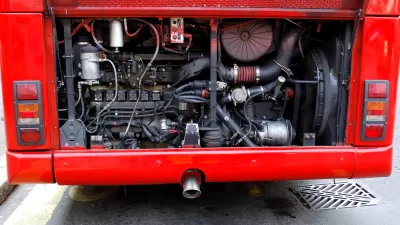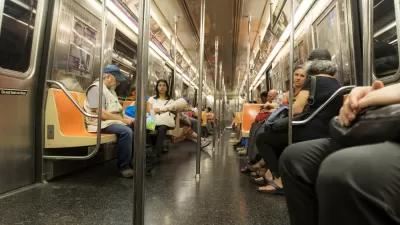Transit use is surging, but operators are facing the same fuel crunch as consumers and public monies for new investments aren't up to addressing the new demand.
"High gas prices are prying record numbers of Americans from their cars and onto buses, subways, and commuter trains. That has many pluses: It eases pocketbook expenses, road congestion, and pollution. But it's also straining providers of mass transit – a signal for needed change.
In Washington DC, the Metro subway and bus system is so stretched at peak hours that officials say the government and other large employers may have to mandate staggered work schedules if gas goes over $5 a gallon – once unimaginable.
In San Francisco and the Bay Area, seats near the doors of some BART trains have been removed to create more standing room for a surge in commuters. Meanwhile, about 20 percent of the nation's public bus operators have had to reduce service because of the high cost of diesel fuel, according to the American Public Transport Association (APTA).
Mass-transit ridership that's at its highest in 50 years presents an opportunity to beef up outdated systems in many areas of the country. But it's not going to be easy.
For starters, the same price pinch that's squeezing drivers is being felt by transit operators. They must pay more for fuel and their revenue sources are declining as the economy slows. More people may be exchanging traffic for tokens, but in some cases, fares cover as little as 20 percent of operating expenses. Mass transit depends greatly on local, state, and federal money – from sales taxes, for instance, which are slowing with the economy, and from gas taxes, which have not kept up with inflation.
As a result, public transit operators are increasing fares and delaying projects and improvements – just what the country doesn't need at a time of increased demand."
FULL STORY: For mass transit, mass investment

Trump Administration Could Effectively End Housing Voucher Program
Federal officials are eyeing major cuts to the Section 8 program that helps millions of low-income households pay rent.

Planetizen Federal Action Tracker
A weekly monitor of how Trump’s orders and actions are impacting planners and planning in America.

The 120 Year Old Tiny Home Villages That Sheltered San Francisco’s Earthquake Refugees
More than a century ago, San Francisco mobilized to house thousands of residents displaced by the 1906 earthquake. Could their strategy offer a model for the present?

HSR Reaches Key Settlement in Northern California City
The state’s high-speed rail authority reached an agreement with Millbrae, a key city on the train’s proposed route to San Francisco.

Washington State Legislature Passes Parking Reform Bill
A bill that would limit parking requirements for new developments is headed to the governor’s desk.

Missouri Law Would Ban Protections for Housing Voucher Users
A state law seeks to overturn source-of-income discrimination bans passed by several Missouri cities.
Urban Design for Planners 1: Software Tools
This six-course series explores essential urban design concepts using open source software and equips planners with the tools they need to participate fully in the urban design process.
Planning for Universal Design
Learn the tools for implementing Universal Design in planning regulations.
Ada County Highway District
Clanton & Associates, Inc.
Jessamine County Fiscal Court
Institute for Housing and Urban Development Studies (IHS)
City of Grandview
Harvard GSD Executive Education
Toledo-Lucas County Plan Commissions
Salt Lake City
NYU Wagner Graduate School of Public Service





























